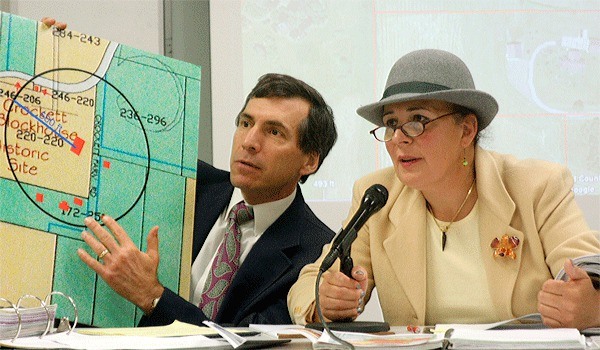A proposal to turn a historic barn in Central Whidbey into a rural event center has opened a rift among the residents of the scenic neighborhood.
Michael Bobbink, the hearing examiner for Island County, had little patience for the applicant, neighbors or attorneys during a lengthy hearing Thursday morning to determine the legality of the Crockett Farm Barn application. In the end, he reluctantly continued the hearing to Friday, June 11 to give more people a chance to speak.
“I’ve heard this all before,” he said, complaining that everyone was just repeating information they already submitted in writing. “We are not going to hear this over and over again. … I have the right to restrict testimony.”
Coupeville resident Paula Spina submitted a site plan review application last June to use the 1895 Crockett Farm Barn as a “rural event center” under county code.
“I’m trying to promote a community gathering place and preserve a historic structure for the community,” Spina said at the meeting, adding that any profits from the event center will be used to stabilize the aging barn.
Island County planning department staff recommended that Bobbink approve the application with a list of conditions aimed at limiting the impact of the neighborhood in the area of Fort Casey Road and Crockett Farm Road. The proposed conditions include the extension of a hedgerow to screen neighbors from the site, a limit on the number of events a year and a 10 p.m. closing time.
Many of the closest neighbors protested the proposal because they feel it would disrupt the rural nature of the area at the heart of Ebey’s Landing National Historical Reserve. The barn has been used for events ranging from fundraisers for nonprofits to dances with live music, but the approval of the application would lead to more intensive uses.
“They were concerned about the general peace and quiet of a rural neighborhood,” Clinton attorney Douglas Kelly said. He represents 17 residents opposed to the application.
The neighbors complained that a parking area would be unsightly and out-of-character in the reserve, the increased traffic would be dangerous on the rural road, that events would be loud and block traffic, and that attendees would trespass onto adjacent property.
It appears that the main legal issue for Bobbink to decide is whether there’s a great enough distance between the rural event center and adjacent uses and structures. County code states that the separation must be at least 500 feet, though it can be reduced if impacts are minimized by topography, screening or particular land forms. Kelly held up a map that showed that five neighboring structures are within 500 feet of the barn.
Bobbink seemed especially concerned that people who attend the event will be able to walk in Spina’s gardens, which are much closer to neighbor’s homes.
“The 500-foot separation standard is a litmus test for determining if a particular site is rural or not,” neighbor James Moore said, arguing that the rural site isn’t appropriate for a commercial use.
The county staff and Spina argue that screening with hedgerows will minimize the impact, but many neighbors were clearly not persuaded. Neighbor Anne Campbell questioned how the “magic bushes” are supposed to screen the view of the event center and preserve the view of the historic barn at the same time.
Some people based their complaints on past events, which occurred under conditional use permits. The guests were loud, stayed up late, blocked the road and trespassed, the neighbors said.
“They wander all the way down to our garden to take pictures of the lake,” resident Sue Symons said. “On our property.”
Symons’ husband, James Moore, complained that a proposed parking area would have a negative impact on him and his neighbors because it would be so close to the road where they drive, walk and meet to chew the fat.
Bobbink interrupted Moore. “Seems to me we are getting relatively petty,” he said, adding that the sight of a parking area is “not a terrible impact.”
Ironically, Spina and Moore both served on the Historical Review Committee and stood together against the county, even threatening a lawsuit, when a permit was accidentally granted for a proposed 5,000-square-foot house not far from the Crockett Farm Barn. They argued that the house would be out of character in the historic area.
Coupeville resident Ken Pickard, a musician, spoke in favor of the application. He argued that the barn has served the community as a rural event center for decades, but that the neighbors had knowingly built within 500 feet of the barn. He also protested the proposed 10 p.m. closing time. He read a newspaper article from 1895 about a party for the barn opening. The article stated that the event didn’t break up until 2 in the morning.
“You can’t have a good time or a good event or a good dance that ends at 10 p.m.,” he said.
Before continuing the meeting, Bobbink warned that the actual legal issues to be decided are “rather small.”



